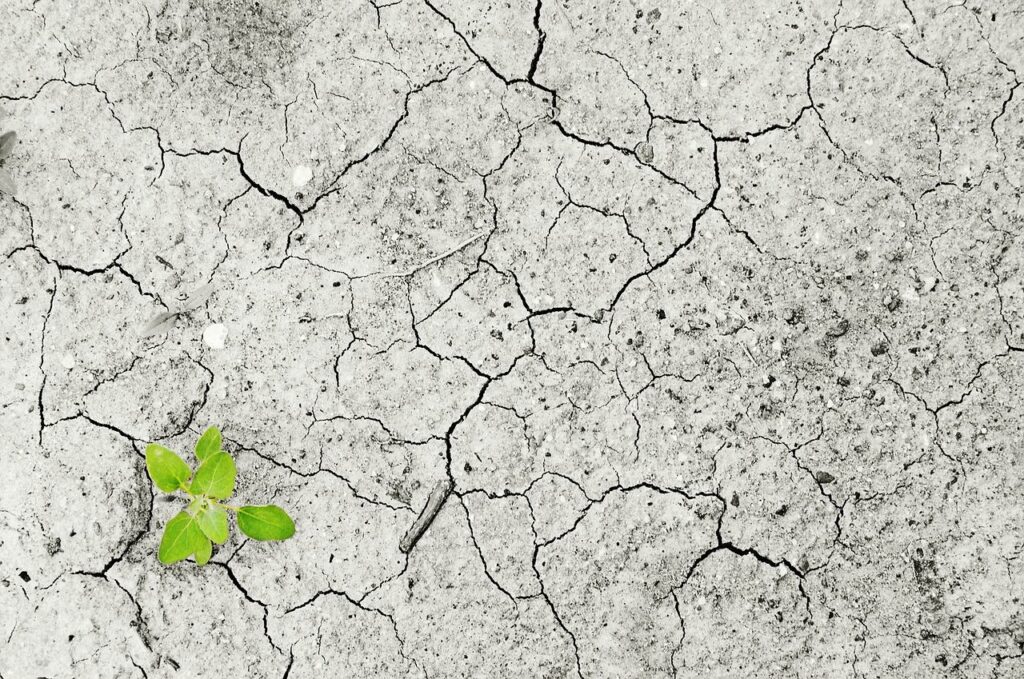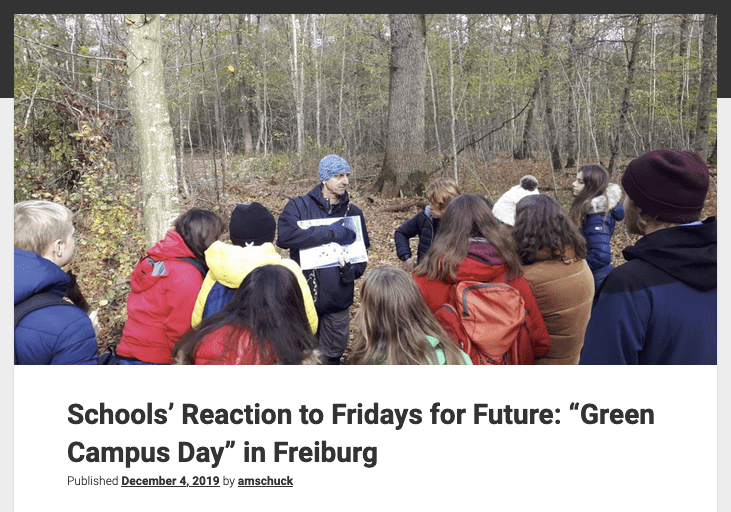Learning Objectives
- To raise awareness about climate urgency, intergenerational justice, and movements for the future
Resources needed
- Internet connection
Warning!
You can try out all activities and excercises, but you can't save any data. Please login or create a free account to save your data.
Climate change, regardless of our age, nationality, or political and economic status, concerns all of us. It is affecting our world today and, as scientists warn, it will continue to do so in the near and far future. This activity aims to raise awareness of the topic of climate change, its urgency, its link to intergenerational justice, and a need for climate change activism.
Exercise 1: Climate crisis: The urgency
For more details, read “What is climate change?”

What do you understand by “climate crisis”?
The Guardian wrote that “climate change is no longer considered to accurately reflect the seriousness of the overall situation” and suggested using “climate emergency or climate crisis instead to describe the broader impact of climate change” (The Guardian, 2019, para. 3).
In addition, a UN’s article (n.d.) states that, “Climate change is the defining crisis of our time and it is happening even more quickly than we feared. But we are far from powerless in the face of this global threat. As Secretary-General António Guterres pointed out in September, ‘the climate emergency is a race we are losing, but it is a race we can win’” (para. 1).
“No corner of the globe is immune from the devastating consequences of climate change. Rising temperatures are fueling environmental degradation, natural disasters, weather extremes, food and water insecurity, economic disruption, conflict, and terrorism. Sea levels are rising, the Arctic is melting, coral reefs are dying, oceans are acidifying, and forests are burning. It is clear that business as usual is not good enough. As the infinite cost of climate change reaches irreversible highs, now is the time for bold collective action” (para. 2). For more details, read “The climate crisis – A race that we can win”
Below is a short quiz about the climate crisis. Check your knowledge and maybe gain new insights by taking the quiz.
Quiz
What is the name of the first international agreement on climate change?
- The Paris Agreement
- The Kyoto Protocol
- The Budapest Protocol
“The Kyoto Protocol was adopted on 11 December 1997. Owing to a complex ratification process, it entered into force on 16 February 2005” (UN, n.d., para 1).
To commit “industrialized countries and economies in transition to limit and reduce greenhouse gases (GHG) emissions in accordance with agreed individual targets” (UN, n.d., para. 2). “What is the Kyoto Protocol?” https://unfccc.int/kyoto_protocol
About the Paris Agreement: The Paris Agreement is a legally binding international treaty on climate change. It was adopted by 196 Parties at COP 21 in Paris, on 12 December 2015 and entered into force on 4 November 2016.
Its goal is to limit global warming to well below 2, preferably to 1.5 degrees Celsius, compared to pre-industrial levels.
To achieve this long-term temperature goal, countries aim to reach global peaking of greenhouse gas emissions as soon as possible to achieve a climate neutral world by mid-century.
The Paris Agreement is a landmark in the multilateral climate change process because, for the first time, a binding agreement brings all nations into a common cause to undertake ambitious efforts to combat climate change and adapt to its effects (United Nations Climate Change, 2022, para. 1-4). For more info, please see “The Paris Agreement” https://unfccc.int/process-and-meetings/the-paris-agreement/the-paris-agreement
The Budapest Protocol does not exist.
What are the five main elements of the Kyoto Protocol? Select those you think belong to the Kyoto Protocol.
- Food waste, Trading, Gases, Recycling, Clean-development mechanism
- Wildlife, Emissions targets, Joint implementation of emission reduction projects, Sustainability
- Trading, Gases, Clean-development mechanism, Emissions targets, Joint implementation of emission reduction projects
“Gases The protocol seeks to control emissions of six heat-trapping gases: carbon dioxide, methane, nitrous oxide, hydrofluorocarbons, perfluorocarbons and sulphur hexafluoride.
Targets The treaty assigns percentage targets for reducing or limiting emissions, compared with a 1990 benchmark, to 35 industrialised countries among the 140 nations that ratified the pact.
Trading The protocol allows emissions trading among the 35 countries. Industrial plants that fall below their output “ceilings” can sell the resulting credits to those that exceed their allowances.
Joint implementation This measure allows a nation to earn credits for developing emissions-reduction projects in other countries that have signed the protocol.
Clean-development mechanism A country may offset protocol obligations by undertaking emissions-reduction projects in developing countries that are parties to Kyoto but are not obliged by the treaty to cut their emissions” (The Guardian, 2005, para. 3-7). “The Kyoto Protocol: Key sections and dates”
https://www.theguardian.com/environment/2005/feb/16/environment.climatechange
How much has the global temperature risen since the 19th century?
- about 2 degrees Fahrenheit (1 degrees Celsius)
- about 4 degrees Fahrenheit (2 degrees Celsius)
- about 10 degrees Fahrenheit (5 degrees Celsius)
“The planet’s average surface temperature has risen about 2 degrees Fahrenheit (1 degrees Celsius) since the late 19th century, a change driven largely by increased carbon dioxide emissions into the atmosphere and other human activities” (NASA, n.d., para. 7). “Climate change: How do we know?” https://climate.nasa.gov/evidence/
Since the 19th century, when did most of the warming happen? In which time period?
- 1890s-1900s
- 1950s-1970s
- 1980s-2020s
“Most of the warming occurred in the past 40 years, with the seven most recent years being the warmest” (NASA, n.d., para. 7). “Climate change: How do we know?” https://climate.nasa.gov/evidence/
Which years are the warmest years on record to date?
- 1999 and 2008
- 2012 and 2018
- 2016 and 2020
“The years 2016 and 2020 are tied for the warmest years on record” (NASA, n.d., para. 7). “Climate change: How do we know?” https://climate.nasa.gov/evidence/
In the past 100 years, how much has the global sea level risen?
- 20 cm
- 10 cm
- 80 cm
“Global sea level rose about 8 inches (20 centimetres) in the last century. The rate in the last two decades, however, is nearly double that of the last century and accelerating slightly every year” (NASA, n.d., para. 11). “Climate change: How do we know?” https://climate.nasa.gov/evidence/
How much have the ice sheets on Greenland and Antarctic decreased in mass in the period from 1993 to 2019? Please select the correct answer
- 134 000 tons
- 234 million tons
- 279 billion tons
“The Greenland and Antarctic ice sheets have decreased in mass. Data from NASA’s Gravity Recovery and Climate Experiment show Greenland lost an average of 279 billion tons of ice per year between 1993 and 2019, while Antarctica lost about 148 billion tons of ice per year” (NASA, n.d., para. 9). “Climate change: How do we know?”https://climate.nasa.gov/evidence/
Your result:
- Correct answers:
- Wrong answers:
In 2022, the UN published a new climate report. If you are interested in exploring it in more depth, please see “Climate change 2022: Impacts, adaptation and vulnerability” https://www.ipcc.ch/report/ar6/wg2/
We hope that you found the interesting and informative. Now, brainstorm for yourself the important topics regarding the climate crisis.
The following article covers a range of topics about the climate crisis “The Climate Crisis – A Race We Can Win” https://www.un.org/en/un75/climate-crisis-race-we-can-win. After reading the article, rank the following topics in their order of urgency to address in your teaching. Please note that there is no right or wrong here, your reply will probably depend on your living and teaching contexts.
Rate the following topics in regards of urgency to address in your teaching.
- Global temperatures are rising
- Food and water insecurity
- New weather extremes
- Climate change, a major threat to international peace and security
- Fundamental transformations in all aspects of society
Global results (all votes)
- Global temperatures are rising (3 votes)
- Food and water insecurity (3 votes)
- New weather extremes (3 votes)
- Climate change, a major threat to international peace and security (3 votes)
- Fundamental transformations in all aspects of society (3 votes)
Exercise 2: Intergenerational justice
Intergenerational justice is another important topic concerning the climate crisis. Below, we offer three definitions of intergenerational justice. Please click on the one that resonates with you.
What do you think are some of the effects of climate change on future generations globally?
Some effects of climate change on future generations are:
- Extreme temperatures leave many families living in poverty with less food, less clean water, lower incomes and worsening health.
- Children’s immune systems are still developing, leaving their rapidly growing bodies more sensitive to disease and pollution.
- Extreme events can destroy homes, schools, child care centers and infrastructure critical to children’s well-being.
- Droughts and flooding can destroy crops and cut access to clean water.
- The UN warns that many families will have to choose between starvation and migration (Save the Children, 2022, para. 4). “Effects of climate change on future generations”
We – all people who live on planet Earth today – must think ahead about what kind of place we are leaving for future generations. Have a look at the following link “The good ancestor”. In a short video, Roman Krznaric discusses how to become a good ancestor and how to think long-term in a short-term world.
After watching the video, do you have ideas what you, as a teacher, could do to become a better ancestor?
This could be an interesting task to do with your learners and inspire them to think how they can be a good ancestor for future generations after them.
Exercise 3: Fridays for future
“Fridays for future” have been in global news for many years now. It is “a youth-led and -organised movement that began in August 2018, after 15-year-old Greta Thunberg and other young activists sat in front of the Swedish parliament every schoolday for three weeks, to protest against the lack of action on the climate crisis” (Fridays for future, 2022, para. 1).
This movement is “fighting for our future and our lives because they are directly threatened by the climate crisis and the ecological breakdown. We are taking action against it because we want to protect the beauty of the earth, the diversity of species and the lives of all beings. Our goal is to overcome the climate crisis and to create a society that lives in harmony with its fellow beings and its environment” (Fridays for future, 2022, para. 1).
A teacher from Germany, Sonja Mewes, wrote a blog about her school’s reaction to the Fridays for future movement entitled “Schools’ reaction to Frydays for future movement: Green campus day in Freiburg”

She wrote that Fridays for future inspired her school “to reflect on how to channel this energy of the students to engage and work on concrete projects related to climate change and environment” (Mewes, 2019, para 1.). Please read the blog and think about your school while you reflect on the following questions.
Think about the following questions and write your response below:
Are there any similar initiatives in your school?
Having read the blog, do you think that any of these would work at your school? Why and why not?
Are there any ideas in the blog that you could take to your school and adopt?
Below, find five tweets created or retweeted by Fridays4future in June 2022. Which tweet do you think was most popular by the end of the same month? Please use the table below to rank them in order of popularity from 1 to 5, with 1 being the most popular tweet.
The eviction of the Maasai people in Loliondo is being funded by the UK and German governments for hunting.@trussliz @ABaerbock why are you funding the extinction of the indigenous Maasai?
STOP these atrocities and the blatant violation of human rights! #StandWithMaasai
— Fridays For Future Kenya Official (@fridays_kenya) June 11, 2022
Vote strongly oppose! #StopEACOP https://t.co/yBcgrtp5Sq
— Fridays For Future (@Fridays4future) June 13, 2022
Girls education shores up resilience#EducateGirlsForClimateJustice #letafghangirlslearn #FridaysForFuture pic.twitter.com/8a9ASxvuuf
— Edwin Namakanga (@edwinNamakanga) June 10, 2022
#ClimateStrike week 169
I totally agree with @WangariMaathai7 wise words when she says “The generation that destroys the environment is not the generation that pays the price.” This is why we demand #ClimateJusticeNow
Keep fossil fuels in the ground!#NoPlanetB pic.twitter.com/0c54u1W3ON— Atlas Sarrafoglu 🌍 #PeopleNotProfit (@AtlasSarrafoglu) June 10, 2022
“This war is something bigger, it’s not about economy, it’s about survival. If we won’t change Putin’s regime then I don’t know how we can have new climate negotiations.”
Russian climate activist @MakichyanA is having his citizenship deprived from himhttps://t.co/dqQy42YPk5
— Fridays For Future (@Fridays4future) June 6, 2022
| Fridays for Future Tweets | My ranking |
|---|---|
| Tweet 1: Eviction of Maasai people | |
| Tweet 2: Climate change in Africa | |
| Tweet 3: Girls’ Education | |
| Tweet 4: Fossil fuels | |
| Tweet 5: Russia |
Which tweet do you think was most popular by the end of the same month?
The first tweet was most popular among the five.

